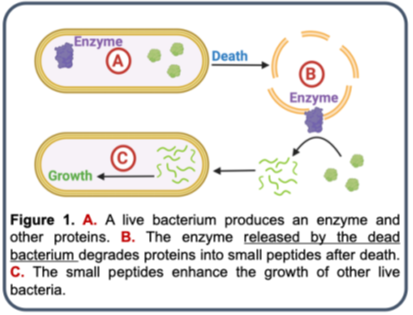Durham Doctoral Teaching Fellowship: Enhancing protein yields for sustainable industry
This project will use new insights into bacterial death and nutrient recycling to devise a low-cost additive to enhance recombinant protein yields for the industrial biotechnology sector.
The challenge for recombinant protein yield in industrial biotechnology and academic research is to increase yields and, therefore, decrease costs. This project will exploit bacterial postmortem biochemistry to develop E. coli strains that increase yield in recombinant protein production.
The ability to express and purify recombinant proteins has revolutionised basic research, biotechnology and biotherapeutics. Areas that have benefited from recombinant biotherapeutic proteins include metabolic disorders, haematological disorders, and oncology. The global recombinant protein market is predicted to reach $2.4 billion by 2027, with an 11.4% compound annual growth rate. Escherichia coli is used for recombinant protein production as it is cheap and straightforward to batch culture to high density. An urgent need is to improve protein yield to reduce costs and enable production to match demand. We propose a simple formulation that can be used in the industrial biotechnology sector to enhance protein yield by increasing nutrient uptake.
The science that underpins this project arises from our study of bacterial death and the recycling of dead bacteria into other live cells. Death and nutrient recycling are poorly understood and remain a challenge for our understanding of microbiology. The existing studies on bacterial nutrient recycling have concentrated on the role of the live, not the dead, organism. The dead microorganism is viewed as having no function other than providing nutrients for live organisms. We have shown that this view is incorrect. We have demonstrated that the dead organism possesses an enzyme that encodes its nutrients' breakdown after death (Figure 1). Based on this enzyme, the project will devise an additive to increase recombinant protein yield.

Objective 1. The student will perform a random mutagenic screen of a protease involved in nutrient recycling in vivo and select novel variants of interest.
Objective 2. The student will use microbiology and molecular evolution tools to understand how the variants of interest impact bacterial population dynamics and nutrient recycling.
Objective 3. Use the tools of biotechnology to examine how the variants of interest impact recombinant protein yield in industrially relevant E coli strains.
The student will receive training in techniques in molecular biology (DNA manipulation, genetics), biochemistry (protein expression and purification, fluorescence assays, enzyme bioassays), and microbiology (culture, genetic manipulation).
Training on research integrity, data management, and data presentation will be provided. The student will present their work in lab meetings, seminars, and national and international conferences. Training in public engagement will be provided as the host institution provides opportunities for broader engagement with the community. The skills developed are transferable to any post-PhD career.
Durham University is a QS world top 100 university, and the Department of Biosciences is nationally leading (2025 rankings: Guardian 4th, Complete University Guide 5th, Good University Guide 6th). The project will benefit from world-class facilities associated with core Biosciences research laboratories embedded into an interdisciplinary environment in the Department of Chemistry.
The project will commence in October 2025. Please contact Professor Martin J Cann for further details.
The studentship is a Durham Doctoral Teaching Fellowship (DDTF). Successful candidates will pursue their research programme and also support the degree programme in Biochemistry/Biotechnology in the Department of Biosciences. The student will develop skills in tutorial delivery, academic support, and assist in the delivery of practicals. This opportunity will give the postgraduate student a diverse teaching and research portfolio.
The ideal candidate will have an undergraduate background in biosciences, independently or in combination with another discipline, preferably with biochemistry and/or biological chemistry knowledge.
This project is in competition with others for funding. Success will depend on the quality of applications received, relative to those for competing projects. If you are interested in applying, in the first instance contact the supervisor (Professor Martin Cann, m.j.cann@durham.ac.uk), with a CV and covering letter, detailing your reasons for applying for the project, by no later than Wednesday 5th February 2025.


/prod01/prodbucket01/media/durham-university/departments-/biosciences/83453-1-1595X1594.jpg)